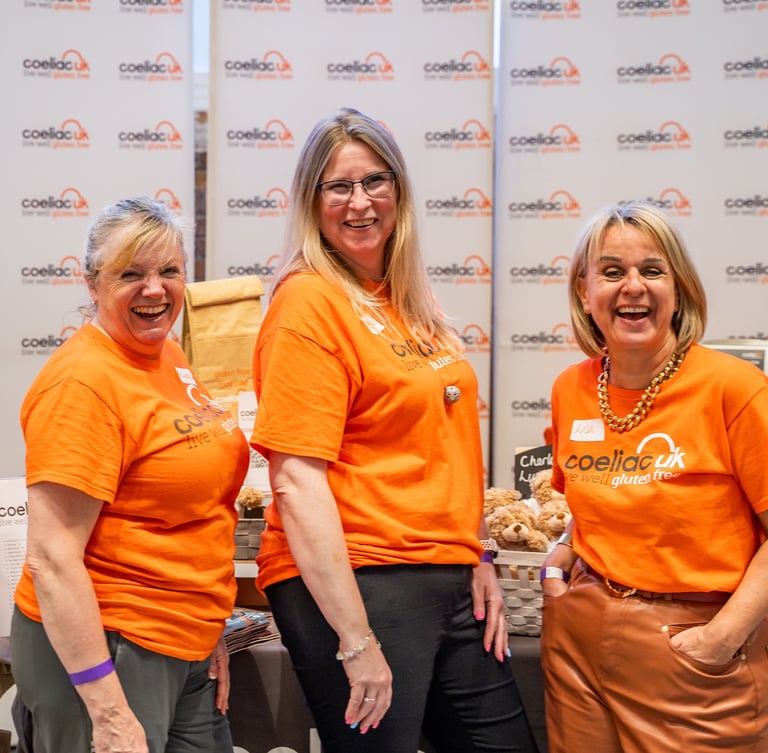Coeliac UK: Empowering Gluten-Free Lives Through Support, Research, and Padel
Discover how Coeliac UK is transforming lives with expert support, groundbreaking research, and promoting physical activities like padel. Learn about coeliac disease, its impact, and how to get involved in our mission for a gluten-free future.
INTERVIEWS AND PROFILESSUSTAINABILITY AND CAUSES
5/31/20245 min read


Coeliac UK are the chosen charity for the month of May in our 12 Months, 12 Causes initiative, and we are excited to tell you more about them and the positive impact they have on the community and the medical research.
We spoke to Caroline Norris, Supporter Relationship Manager and her colleague Tessa Gribbin, about the charity's vital work, the challenges faced by those with coeliac disease, and how physical activity like padel can improve their quality of life.
Q: Coeliac UK have been a leading voice for the coeliac community for many years. Can you tell us more about the charity and what you do?
"Coeliac UK are the experts raising awareness of coeliac disease, providing trustworthy advice and support to those living with the condition, funding critical research to find a cure, working with healthcare professionals to improve diagnosis and fighting for better availability of gluten free food. And we do it all so that one day, no one’s life will be limited by gluten."
Q: Beyond raising awareness, what is the mission of Coeliac UK?
"We work hard to keep coeliac disease and the gluten free diet on the agenda and there are some key issues facing our community at present. These include:
Improving diagnosis
With 1 in 100 people with the condition but only 36% of these diagnosed, we estimate there are nearly half a million people in the UK who have coeliac disease but don’t know. We want to find these people.
The average time from the onset of symptoms to a coeliac disease diagnosis is currently 13 years. This is too long and we’re working with healthcare professionals and policy makers to improve this and prevent years of ill health due to late diagnosis of coeliac disease.
Better care
Once people have the diagnosis, access to care should be uniform and ensure that you are successfully managing the gluten free diet and risk of complications. Without guidelines for healthcare professionals to follow, management of coeliac disease patients can be a postcode lottery and we are working to change this.
Gluten free prescribing
With the NHS making budget cuts we have seen some areas remove some levels of gluten free prescribing. We strongly believe that there should be equal access to gluten free staple foods on prescription for people with coeliac disease and that this should stay within the NHS.
Access to gluten free food
No matter where you live, you should be able to access a range of gluten free food at a reasonable price. We are working to make sure that those with the power to make this happen are aware of what people with coeliac disease need.
Managing a gluten free lifestyle
Everyone should be able to eat out and enjoy choice, whether you have coeliac disease or not. We’re making the case to caterers and restaurateurs that they should cater for your diet and do it well so you can eat out safely."
Q: For people unfamiliar with coeliac disease, can you explain what it is, the typical symptoms and its impact on people’s health?
"Coeliac disease is a serious autoimmune condition that affects an estimated 1 in 100 people. In coeliac disease the body’s immune system attacks its own tissues when gluten (a protein found in wheat, barley and rye) is eaten.
This causes damage to the lining of the gut and the body cannot properly absorb nutrients from food. It is not an allergy or food intolerance.
Symptoms can vary between individuals both in type and severity and may include bloating, diarrhoea, nausea, wind, constipation, tiredness, anaemia, mouth ulcers, sudden or unexpected weight loss and skin rash (dermatitis herpetiformis).
Left undiagnosed it can lead to complications such as osteoporosis, subfertility, neurological dysfunction and in rare cases small bowel lymphoma. Therefore, testing and confirmation of a diagnosis of coeliac disease is really important.
If you or someone you know are experiencing any of these symptoms, take our online self-assessment at isitcoeliacdisease.org.uk and see if you should be tested.
To be tested for coeliac disease you must have foods containing gluten within your diet in at least one meal per day, every day, for a minimum 6 weeks. This is because the blood test for coeliac disease looks for antibodies that are produced in response to eating gluten, so if gluten has been removed there is the possibility of having a false negative result.
If you have a positive blood test you will be referred to a specialist to confirm your diagnosis with a second blood test and in some cases you may need an endoscopy and biopsy. This is where a small tube with a camera on the end is passed through your mouth into your gut to look at the lining and small samples of tissue are taken for further viewing under a microscope.
If a first degree family member (such as mother, father, sister or brother) has the condition then the chances of having it increase to one in ten so if someone in the family gets a positive diagnosis, the immediate family should also be tested."
Q: Living with coeliac disease requires managing the condition. Can you share some tips for people with coeliac disease to better cope with it?
"The treatment for coeliac disease is a strict, lifelong gluten free diet and once coeliac disease is confirmed, it’s important to start a gluten free diet straight away. Once gluten has been removed from the diet, the gut will begin to heal and you will usually start to feel better within a few weeks.
However, it can take between six months and up to five years (and in some cases longer) for the gut damage caused by eating gluten to fully heal. The good news is that many foods are naturally gluten free and we can help you learn about all the foods that are suitable for your new diet.
You can find lots of tips to get you started here."
Q: We're passionate about promoting the benefits of padel. Can you share any insights on how physical activity like padel can positively impact people with coeliac disease?
"Including physical activity and exercise in your lifestyle offers numerous benefits, such as:
Encouraging healthy growth and development during childhood
Helping to maintain a healthy weight
Keeping your heart healthy by lowering blood pressure and reducing the risk of heart disease and stroke
Strengthening bones and muscles, thereby reducing the risk of osteoporosis
Preventing Type 2 diabetes
Boosting your mood and energy levels, making you feel happier and more energised.
Following a diagnosis of coeliac disease, eating a well-balanced, varied gluten free diet, which includes a wide range of foods, will make sure that you’re getting all the nutrients you need to fuel your body for exercise and physical activity.
You can find out more about the gluten free diet here."
Q: Thank you so much for sharing your expertise. We learned a lot today about coeliac disease and the important work of Coeliac UK. For people and businesses who are interested in supporting the charity's mission, how can they get involved?
"There are lots of ways you can get involved in supporting those who need to live gluten free through the work we do at Coeliac UK, from fundraising events to getting involved with your local community, joining our campaigns and lots more.
Find out more here."
Thanks to Caroline and Tessa for sharing their insights on coeliac disease and the impactful work of Coeliac UK. To support their mission, consider participating in fundraising events, joining local campaigns, or spreading awareness.
Find here below how to make a difference in the lives of those living gluten-free👇
Find out more about Coeliac UK
Coeliac UK has provided trustworthy advice, support, and resources to people with coeliac disease for over 50 years.
💪Together we aim to enhance coeliacs' quality of life!
Coeliac UK - Registered Charity No. 1048167 (UK & Wales) No. SC039804 (Scotland)



Coeliac UK team at Free From Festival
"Coeliac disease is different for everyone" video
👇Follow us on👇
© 2025 Padel Vibes Ltd. Padel Vibes® is a registered trademark. All rights reserved.
